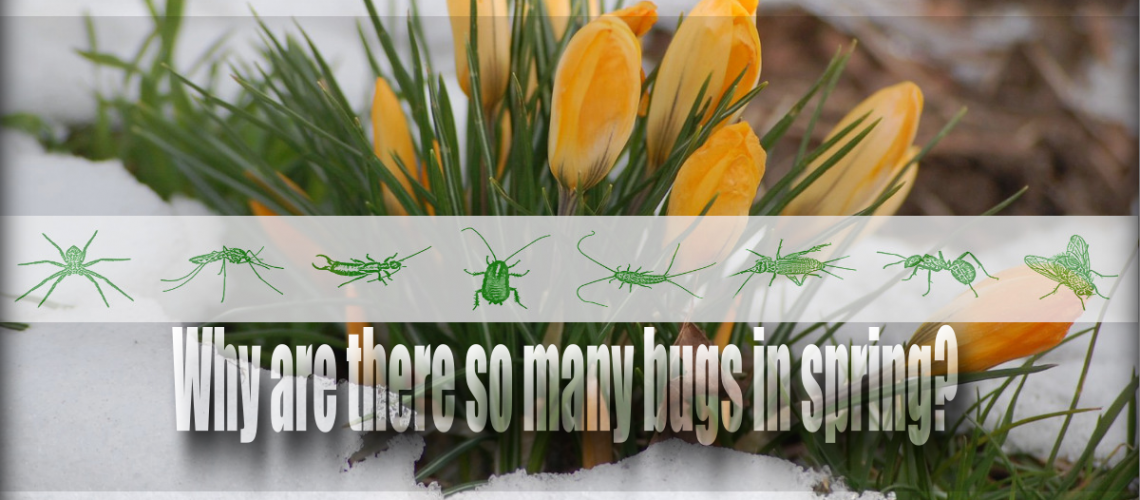Why do we see more pests in the spring?
In Nevada, virtually every critter we know as pests seemingly spawn in the spring. With increased numbers, people encounter them more because of warm weather. Longer days give us more time and energy to do more things, like gardening, BBQing, and fixing up the house. These activities entail cleaning and shuffling dusty furniture around the house, stirring the pest-nests. A gardener knows to expect them, but many homeowners squeal to discover rats in the garage, cockroaches inside the kitchen cabinets, and even scorpions under the grill covers. With the hotter temperature, pests continue to increase. We find it appropriate to refresh your memory about why there are so many pests in the spring.
What the spring pest influx is about
According to the data we have, it’s clear that Las Vegas communities increase their reports of pests substantially over the warm and muggy months. It is because of the influx of bugs birthing when the climate changes. It overwhelms us so quickly because of how these bugs survive the winter.
Not that we’ve tested all their capabilities yet, but the following methodology of insect survival is what we deal with most often as a pest control company.
![]()
How pests survive the icy winters
Insects migrate seasonally
When the chills roll in, many insects will buzz off to warmer weather, like the snowbirds from the Northwest to Arizona during the winter. One of the most known Monarch butterflies migrates for thousands of miles every turn of winter and spring. Cicadas and locusts are migrating species, always buzzing from one warm and lush ecosystem to the next. They seemingly arrive en mass when our time comes. Often after a long and quiet winter, their noisy business is more noticeable.
Bugs and vermin move indoors
The ever-hungry rodents will fatten themselves up during the summer in anticipation of being less active during the winter when they settle down in the hidden corner of the house. Most spiders will move indoors to avoid exposure to nippy weather. Given ample time for pests to settle in your home, come spring, unpleasant surprises lurk behind storage boxes and clutter when you move things around for cleaning.
Communal living
Social insects like bees will cluster with their hive, fluttering their wings and using soundwaves to keep each other warm throughout winter. When spring arrives, bees are well starved for fresh nectar and pollen. At the same time, some bee colonies split up the hive, one having to migrate to establish a new colony elsewhere. It’s the primary reason we stumble upon hives of bees more often in the spring and summertimes.

Dormancy (Diapause)
When the weather is too cold and hardly anything available to eat, specialized insects will pause their physiological development by resuming a state of diapause, or dormancy. Like hibernation, diapause drastically lowers a bug’s metabolism, allowing it to survive the winter without needing to expend energy. Many species can enter diapause in various forms. A caterpillar implements the cocoon, for example, and the eggs of the mosquitoes can remain dormant while embedded in frozen grass blades and soil. Then when spring arrives, they spawn from the earth and hunt humans and other warm-blooded mammals. Many temperate-climate insects can remain dormant as egg, larva, nymph, pupa, or adult forms to survive the winter. Hence when spring arrives, innumerable insects rouse and go directly into hunting mode. Humans are merely one source of nourishment they crave.
Torpid state
The weta of New Zealand is a flightless cricket that lives in high peaks and blizzard cold. When the temperature is subzero at night, the crickets completely freeze, solid as a pebble of ice. On days when the temperature rise, the weta resumes activity like tiny robots on a timer (Resource section #5). This peculiar torpid state is usually temporary, lasting overnight in the temperate zone.
Bugs produce antifreeze.
Freeze-susceptible insects accumulate sufficient glycerol to lower their bodys’ freezing point by 10 °C (Resource #2). This capability allows the insects to roam on the snow and ice, hunting through the scarcity of winter, thus ensuring their survival until spring, when the urge to reproduce is high. Because many bugs can produce within weeks, springtime can hatch pests by the billions.
How do spring pests affect Las Vegas?
During peak pest season in Las Vegas, the service lines are buzzing off the hook because there’s an influx of interest in pest control. During the spring and summer months, exterminators are on a tight schedule, and new clients are difficult to fit in. For this reason, early spring is the best time to arrange a general pest control service to prevent any outbreak.
To exterminate spring pests in Las Vegas.
Likewise, Humans tend to fatten up for the winter, only to want to shed that excess in the spring. Like animals, we become more active and outgoing when the sun gives us warmer and longer days. For this reason and because pests are also waking up from hibernation, people cross paths with bugs more often in the spring and summer months. Every reputable pest control database would reveal this as a fact. Henceforth, we recommend being cautious when tending to your property after a long winter pause. Better yet, relieve yourself of the fear and register for general pest maintenance with the most affordable pest control company. In Las Vegas, Pest Pros is not the only pest company. However, we are the ones with supernatural power we refer to as “superior customer service.” Coupled with our competitive price and efficient methods, our pest control company is the most affordable in the greater valley. Call us and find out!RESOURCES
- The climate in Nevada: https://www.bestplaces.net/climate/state/nevada
- Insect antifreeze and ice-nucleating agents
- https://indianapublicmedia.org/amomentofscience/bug-antifreeze.php
- Dormancy – Diapause: Britannica.com/science
- Hadley, Debbie. “Where Do Insects Go During Winter?” ThoughtCo, Jul. 31, 2021- Topor
- In-house training classes with the Agriculture Department of Nevada
- Bug Antifreezing
- Which-animals-do-not-sleep-5-species/



